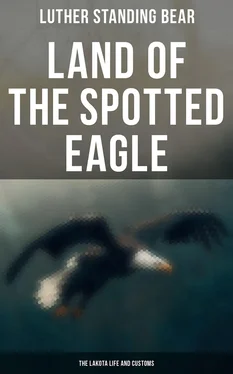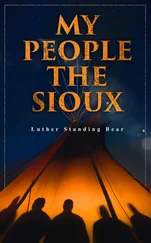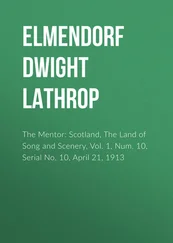Father had a great sense of the rights of animals and was a true humanitarian. His ideas along this line would meet with the approval of any humane society in the land and I am sure it would be hard for him to tolerate some of the brutalities one sees on a city street. Father inculcated in me a feeling of interdependence toward my horse something like one would feel towards a companion. The dog had been the age-long companion of the Lakota woman, assisting her in household duties and the care of children, but the horse was the Lakota man’s most trusted friend in the animal kingdom.
In order to see that my ponies were well fed and kindly treated, father once said to me, when presenting me with a fine pony, ‘Son, it is cowardly to be cruel. Be good to your pony.’ So in the winter I never turned him out to forage as best he might. I placed him in the cottonwood groves for protection. There was a grass that grew in damp places or bordering streams and that stayed green all winter. Our horses were very fond of it and father had me cut bundles of it to carry to my pony. In the summertime when I went to the stream, it was suggested that I should take my pony and throw water on him; and if we found deep water we swam together, my hand grasping his mane.
When I grew to be a young man I possessed a great pride, just as had my father in his youth, in riding a fine horse. When, as a young brave, I went out on parade, I brushed my horse until he shone, wove wreathes of sweet grass for his neck, and tied eagle feathers to his tail and mane.
All this was in accordance with the Lakota belief that man did not occupy a special place in the eyes of Wakan Tanka, the Grandfather of us all. I was only a part of everything that was called the world. I can now see that humaneness is not a thing which can be ordered by law. It is an ideal to be lived.
It was at councils, feasts of the lodges, and ceremonies that children learned a great deal concerning social conduct and manners. Social custom was closely observed and many ceremonies, both social and religious, were performed according to strict form. The men, especially the warriors and councilors, were quiet and dignified in manner. The women were quiet too, and very retiring. Loud talking and exaggerated or boisterous actions were considered very unseemly for either man or woman. The speeches were short and spoken without affectation. The dancing was done mostly by the warriors, and the singing by groups who were trained for such occasions. The women, dressed in their best, sat around the circle watching the scene with interest. When food was served everybody joined.
These gatherings were for all members of the band, so whenever my parents attended I was allowed to go. Children were never put to bed to be got out of the way, never given some work to do, nor pushed off to play. My father and mother enjoyed my presence; of that I am sure.
There was much dressing for these festivities and whenever my parents dressed up I was dressed in my finery too. It seems to me that father must have considered me a very valuable boy, or else his pride in me was more than ordinary, for he was always dressing me up. Of course, it may be that I, like all small boys, found it very disagreeable to be dressed in fine clothes. Anyway, I well remember that father made for me a very long, heavy ornament for my hair. I disliked very much to wear this headpiece, for it was made of six or eight silver disks, graduated in size, and strung on buckskin. It was a very wonderful ornament to be sure, but its weight was something to be appreciated and furthermore it was tied to what white people are pleased to call the ‘scalp lock.’ Now when father dressed for some festivity he would paint my face, smooth my hair and tie my confirmation plume at the left side of my head at the top, and tie the silver ornament so that it hung down the back of my head. I always went as father dressed me and never told him how uncomfortable I felt. But I would wait my chance, and when he was occupied and could not see me, I slipped over to mother, told her of my discomfort and that I could not play well. Like all mothers she knew well how little boys like to play, so, saying nothing, she would slyly remove the ornament from my head. Mothers have a way of doing things for little boys and girls without disturbing father’s feelings about them.
There was another ornament that father made for me and which no boy could wear with comfort. This was a breastplate made of imitation bone beads some three or four inches in length and put together with small brass beads. It covered my small chest and extended beyond my shoulders in such a way that I could not lift anything from the ground, nor could I shoot my bow. Such an ornament was considered very elegant and I may have looked very imposing in the eyes of my father, but how could any boy get joy out of life if he could only carry his bow in his hand?
It was at these councils that we listened to wisdom and learned to regard it with esteem. Parents instructed the young to be quiet and respectful and soon they felt the importance of their tribal gatherings. The old warriors retold stories that had become tribal history. Some of these stories had been told many times, but yet were never old. There were always the young to tell them to, and, besides, the people lived over their lives through the memory of great events. The young warriors, some of them just back from their first big hunt or war-party, told their stories in song and dance. Some may have come home badly wounded, while some may have been fortunate and killed many of the enemy without meeting with mishap. A mark of special bravery was to rescue from danger a friend who had either been wounded or lost his horse. Every young brave who was entitled to do so, wore his decoration indicating his deed. If he had been wounded, he painted his wounds with red, and likewise his horse if it had been wounded. One young man—I forget his name—told a thrilling story of his attack on a buffalo. He was returning home from a war-party. He carried his gun, for it was after the coming of the white man, but he was out of ammunition. His only weapon was a knife. He became very hungry, for he had been without food for several days, and game on the plains had been very scarce. At last he came upon a small herd of buffalo and seeing one lying on the ground and apart from the others conceived the idea of killing it with his knife. Getting on the leeward side of the animal, the young warrior crept close enough to spring upon its back. Grasping the long hair upon the neck, the brave plunged his knife into the infuriated animal. The charging buffalo was unable to throw him off and finally the kill was made. The young man had his meal and continued his journey homeward.
At these ceremonies, praises were sung for all our braves and it was there that the boys determined to be braves themselves some day. They wanted to be men of courage and to merit praise and honor. Within me, I can still feel the force of those stirring songs.
The Victory ceremonies centered about the young warriors and everyone was very proud of them. This was because the young hunters and warriors were the protectors of the tribe. To them everyone, young and old, looked for protection. Lives, food, property, and fireside were in their keeping and the cost was theirs even to giving up their lives. For this reason, mothers and sisters joined happily in honoring the braves at these big celebrations.
Mother further interested me by sometimes talking about the braves. She would tell me what they had done and why they were honored. Men in council were there because of merit. A man might be poor in goods, own few horses, and live in a small tipi, but he would sit with the council. Riches brought no man power and though he might have many horses he could not buy a seat with the wise ones. Mother tried, I believe, to develop in me a spirit of fair dealing and also the wish to appraise people justly.
Читать дальше












